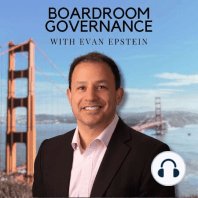64 min listen

Joe Nocera and Kate O'Leary: Unpacking HBO's Succession (Season 4).
Joe Nocera and Kate O'Leary: Unpacking HBO's Succession (Season 4).
ratings:
Length:
55 minutes
Released:
Dec 11, 2023
Format:
Podcast episode
Description
*Prior episodes reviewing Succession:Season 1: E98 (May 22, 2023)Season 2: E102 (June 26, 2023)Season 3: E109 (Sept 11 , 2023)0:00 -- Intro.2:12-- About the podcast sponsor: The American College of Governance Counsel.2:58 -- Start of interview.3:54 -- On the influence and leadership style of Logan Roy. The "ultimate corporate governance challenge."6:41 -- Comparing the (fictional) Roy family with the (real) Murdochs and Sultzbergers. "Why is Logan trying to sell Waystar? The answer is simple. He knows his kids can't cut it. So, his way of getting out of this whole dilemma is to sell the company, give the kids billions of dollars, you know, as their share for their stock, and then let them all go their own way."09:47 -- On dual-class share structures. "[In the media business] just because you have dual shares doesn't mean you will always be protected from the vagaries of the marketplace." (example: the Bancroft family with the WSJ).13:06 -- On the role of media and politics. Joe Nocera: "My line on succession is using succession to understand corporate America is like using the Simpsons to really understand small towns." 18:42 -- On corporate money in politics: "Forget Presidential elections. The real thing that happens in real life is that companies give lots of money to congressmen and senators who are on committees that they care about and who are willing to do their bidding. That's how it works. And that's why the little guy always gets screwed in these things, because they don't have the potency. They don't have the money. They don't have the access. And in terms of influence, it's not just media. It's all kinds of companies that are doing this for their own interest. And that's the way the world works. Is it nice? Is it good? No, not necessarily, but that's how it works."19:57 -- On fraud and stockholder litigation. The overstating of subscribers in India by GoJo.24:05 -- The role of the board of Waystar Royco in the takeover negotiation with GoJo. The example of Twitter acquisition by Elon Musk, and HP-Autonomy. Joe Nocera: "Companies overpay all the time because the CEO wants to build his empire, because they think there's something there that turns out not to be there, because they're in a competition with another company and they got to have this victory. Overpaying is very normal and then you have these multi-billion dollar write-downs blah blah blah."28:23 -- Comparing Lukas Matsson to Elon Musk. "The rise of the ungovernable CEO."30:34 -- On obstacles to women in the workplace. The cases of Shiv, Geri and Ebba. Kate: "It's an extreme version, but these are real issues that real women face all the time. I don't know that there's a corporate governance solution to it, other than culture, right? You know, it all comes back to culture and how you build culture." 36:35 -- On corporate culture: Joe: "In the modern age, the Rupert Murdochs and the Logan Roys are anomalies. I mean, you've got a situation now where David Solomon at GS is being widely criticized. Why? Because he's a harsh boss, he's a brutal boss, he makes demands, he's not an empathetic person. And nowadays companies want leaders that can nurture and lead by example and can get people to do things because they want to do them for the person or the company rather than they have to. And so, and then, you know, nowadays they can't even get the employees to come to work."39:12 -- On ESG and the politicization of corporate governance. Joe: "Why did the ESG come along in the first place?A lot of the reason is because the employee base at a company like Kellogg's, or Procter & Gamble, or Xerox, or IBM, they're mostly socially liberal. They're pro-choice. They're pro-environment. They're pro-BLM. And a lot of this movement began in the first place because companies wanted to make their employees happy. They wanted to give their employees a sense of a higher purpose than just, you know, banging out copier machines. And so ESG evolved. You go to a company like Gene
Released:
Dec 11, 2023
Format:
Podcast episode
Titles in the series (100)
Suzanne Vautrinot: From the Military to the Corporate Boardroom, with a Focus on Cybersecurity.: In this episode, I talk with Suzanne Vautrinot, President of Kilovolt Consulting, a cyber security strategy and technology consulting firm, and a member of the board of directors of CSX Corporation (NASDAQ:CSX), Ecolab (NYSE: ECL), Parsons Corporation (NYSE: PSN), the Battelle Memorial Institute and Wells Fargo (NYSE: WFC). Suzanne retired from the United States Air Force in October 2013 after 31 years of distinguished service, including as Major General and Commander, 24th Air Force, Air Forces Cyber and Air Force Network Operations where she oversaw a multi-billion dollar cyber enterprise responsible for operating, extending, maintaining, and defending the Air Force portion of the Department of Defense global network. She has been awarded numerous medals and commendations, including the Defense Superior Service Medal and Distinguished Service Medal. We focus this discussion on her lea by Boardroom Governance with Evan Epstein